Yemen Civil War Becoming Regional
With everything going on in Libya, Egypt, Syria, and Tunisia, the last thing that the world needed was for unrest and war to spread to yet another country in the Middle East. Yemen, the poorest country in the Arabian Peninsula and a historic site of unrest, is the latest to be engulfed in the sectarian conflict between Saudi Arabia and Iran.
In recent days, the northern Iran-backed Shiite forces (Houthi) seized the capital of Sana’a, forcing President Hadi, himself a Sunni and backed by Saudi Arabia and the United States, to flee to the southern port of Aden and then to Riyadh. In return, Saudi Arabia, backed by the rest of the Gulf Cooperative Council, began a bombing campaign to stem the Houthi advance.
Reuters (“Yemeni leader Hadi leaves country as Saudi Arabia keeps up air strikes on Houthi rebels“):
Yemen’s President Abd-Rabbu Mansour Hadi left his refuge in Aden for Saudi Arabia on Thursday as Houthi rebels battled with his forces on the outskirts of the southern port city.
Throughout the day, warplanes from Saudi Arabia and Arab allies struck at the Shi’ite Houthis and allied army units, who have taken over much of the country and seek to oust Hadi.
[…]
The Saudi-led military intervention marked a major escalation of the Yemen crisis, in which Iran supports the Shi’ite Muslim Houthis, and Sunni Muslim monarchies in the Gulf back Hadi and his fellow Sunnis in Yemen’s south.
Iran denounced the surprise assault on the Houthis and demanded an immediate halt to Saudi-led military operations.
Tehran also made clear Saudi Arabia’s deployment of a coalition of Sunni states against its Shi’ite enemies would inflame the sectarian hatreds already fuelling wars around the Middle East.
Of course, it is far too simplistic to view this new conflict as just a proxy struggle between two regional powers. Yemen in particular has a complex mix of tribes and religions and a history of changing allegiances. In fact, Ali Abdullah Saleh, Hadi’s Shiite predecessor who was deposed in the Arab Spring uprisings, is said to have allied himself with his co-religionists, the Houthis, in an attempt to regain power. His support of the rebels has fractured elements of the Yemeni military along tribal and sectarian lines and adds a personal element of revenge to the mix.
NYT (“Egypt Says It May Send Troops to Yemen to Fight Houthis“)
The Saudi Arabian-led military intervention immediately raised the threat that Iran might retaliate by increasing its own support for the Houthis with money and weapons — as Tehran has in the past — or with a more active military role, escalating the violence. But the struggle for Yemen is more than merely a sectarian conflict or a regional proxy war, in part because of the singular role of Ali Abudullah Saleh, the country’s former strongman.
Mr. Saleh left power under pressure from an Arab Spring uprising under a transitional plan brokered by Saudi Arabia and the other Persian Gulf states. As president, he fought wars against the Houthis and at times appeared to ally with Saudis against Iran.
But he is a member of the same Shiite sect as the Houthis, and he has now struck an alliance with them in an apparent bid to restore himself and his family to power. He has helped lead units of the Yemeni military and security services to swing to the side of the Houthis against his successor, Mr. Hadi, and analysts say Mr. Saleh has played a much more critical role than Iran has in enabling the Houthi advance.
Some of the Houthi allies have even begun calling for the election of the former president’s eldest son, Ahmed Ali Abdullah Saleh, as Yemen’s next leader. An ambassador to the United Arab Emirates and a former commander of Yemen’s elite Republican Guard, the face of the younger Mr. Saleh now appears on billboards around Houthi-controlled Sana urging his selection as the country’s next president.
Lest we forget, in the midst of this chaos, Al-Qaeda in the Arabian Peninsula (AQAP) is waiting in the wings and may take up the banner of the Sunni cause in a similar way that ISIS has in Syria and Iraq.
WSJ (“As Yemen Fractures, al Qaeda Looks to Gain“):
With Yemen’s president out of the country and its army fractured, al Qaeda is trying to define itself as the most capable force to protect the Sunni majority and gain support in what it calls a holy war against a Shiite rebel movement backed by Iran.
Western diplomats have warned that Al Qaeda in the Arabian Peninsula, based in Yemen, could take advantage of the power vacuum to expand.
“We’re watching very carefully at the moment, with all the security failures in Yemen, that the opportunity AQAP has right now may allow them to expand and will enable their activities,” said a senior State Department official.
In the absence of an effective national military, powerful Sunni tribes have mobilized to counter the advancing Houthis forces, who represent a branch of Shiite Islam.
Some have long been a source of support for the AQAP, actively fighting alongside the extremists or turning a blind eye to their activities.
AQAP’s new media liaison claimed the latest fighting would bring new recruits.
The ultimate danger is that Yemen, which has never had a strong history as a centralized state, may degenerate irreparably along sectarian lines or even into a failed state with regional warlords and strongmen in control. It is difficult to see how intervention by the Saudis or the US would help matters in the long run. The situation on the ground is messy, with multiple players and shifting alliances, and as the WSJ article mentioned, foreign intervention may instead lead to lasting resentment among the locals.
Many Yemenis oppose outside intervention to restore Mr. Hadi’s unpopular government. Yemenis also have a history of mistrusting Egypt and Saudi Arabia, leaders of the emerging anti-Houthi coalition, since both countries invaded Yemen during its 1960s civil war.
Indeed, in this part of the world, memories are long and grudges slow to resolve. The long-term consequences of an intervention are unpredictable, and as we saw in Syria, upsetting the balance too much in favor of one party may lead to the rise of extremists. In the end, the best thing for the west to do may be to observe from afar.

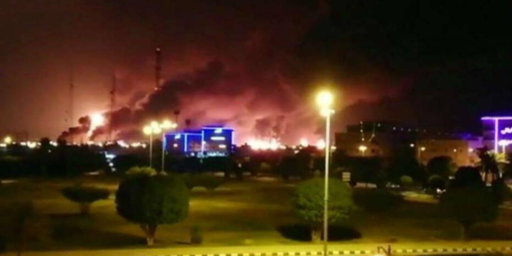
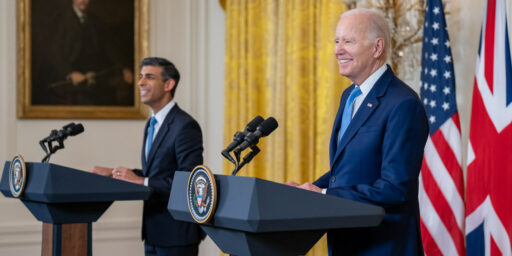
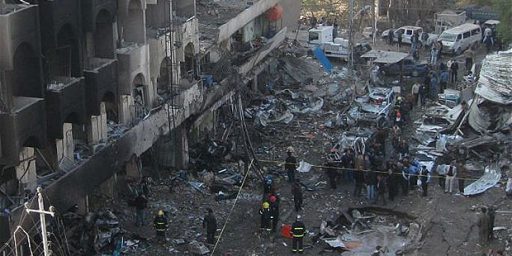
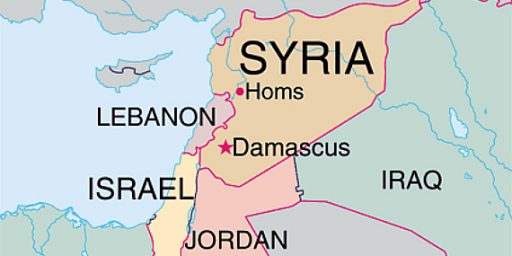
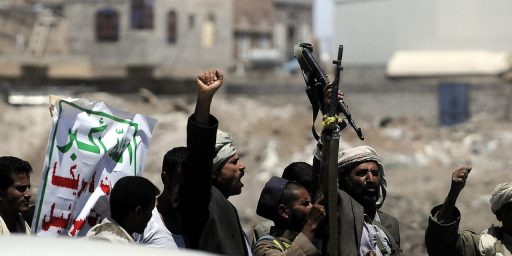
“If you can take down the central government of Iraq, you can easily see pieces of Iraq fly off. Part of it the Syrians would like to have in the West. Part of Eastern Iraq the Iranians would like to claim – fought over for eight years.
In the North you have the Kurds, and if the Kurds spin loose and join with the Kurds in Turkey, then you threaten the territorial integrity of Turkey. It’s a quagmire if you go that far and try to take over Iraq.” – Dick Cheney 1991
And it’s even worse than he predicted. What a hornet’s nest he a Dub-yah broke open.
I am increasingly of the opinion that we should see this religious war as an excellent opportunity to go home.
This is not manageable by the United States. Once we took down Saddam and followed that up with a thoroughly incompetent occupation, the die was probably cast. The power vacuum we created is being filled and there’s nothing to recommend any of the players aside from the Kurds.
Our strategic interests are 1) Oil and 2) Terrorism. We should guarantee freedom of navigation in the Gulf. But all sides will sell us oil. We should be prepared for a new style of terrorism in the west: Sunni-on-Shia played out in Europe. But standing aside for a while as sectarian war rages might actually help limit terrorism against the west.
This is not our fight. We sure as hell helped to catalyze it, but it is not something we can direct or control. Time to fly away.
No much more to say, except, psych!
@JKB:
Demonstrating once again that for you all politics is Obama Derangement Syndrome.
Now can the adults discuss this while you go suck a lollipop?
Arab-Persian, Sunni-Shiite, various tribes and ethnic groups with an overlayer of corruption and venality. This region is just one big circular firing squad. We don’t need to be in the middle of it.
Having said that. I think we need to get over our own long held grudges against Iran and start moving toward a better working relationship. Iran is a rational actor and at least semi-democratic.
@JKB: Look at the title, and then look at your post. See the disconnect?
@Scott: I agree about Iran, but I don’t think we can really wash off our hands of Yemen, a piece of arid, miserable desert, that happens to sit astride one of the most important global trade routes.
Another thing of note: Yemen is basically running out of water, so this civil war might be a good prequel to what will happen globally by mid-century as global warming advances..
@humanoid.panda: Yemen looks to have about five different catastrophes converging on it at once. I can’t think of a scenario that doesn’t lead to hundreds of thousands of casualties. It’s Somalia without arable land, with worse neighbors.
@humanoid.panda: Good point. It is one thing to focus on religion or ethnicity or tribalism but sometimes good old jockeying for economic resources can be a large factor in a conflict.
@Scott: @humanoid.panda:
Iran and Saudi Arabia are not in this for water. However it started, it’s turned into a regional power Shia-Sunni pissing match. The Egyptians are getting in with troops and the Saudis are dropping bombs and perhaps at some point may even send their Filipino house boys out to fight for the honor of the House of Saud.
I don’t believe in single motivations, all motivations are mixed. But it is hardly a coincidence that in Yemen and in Syria-Iraq, the lines are increasingly drawn along sectarian grounds.
Of the two sides I prefer the Iranians. It wasn’t Shi’ites who flew planes into the World Trade Center and the Pentagon. That stuff was straight out of Saudi and Egypt. But even better would be to sidle out of the room and let these two sides go at it. We have exactly zero dogs in that religious war.
@Pinky:
One big difference is that Yemen has a big neighbour who has a vested interest in maintaining stability there. Somalia has… maybe Ethiopia, who occasionally sends in peacekeeping forces when things get out of hand.
Unfortunately, this also means that more advanced weaponry will be deployed by SA, resulting in a more bloody conflict.
@Richard Guo: The only way the Saudis could stabilize Yemen now is by conquering it and clamping down. And when I say “stabilize Yemen”, I mean rule over the smoldering remains of it.
@michael reynolds:
I agree with this. I think we have an interest in maintaing a “balance of terror” between the sides, however. This means that repairing our relationships with Iran is important.
I would also add interest 3) protecting Israel. The best way to do that is to keep them from getting caught in the crossfire (e.g., keep them from bombing Iran).
@Pinky:
I don’t think they want or need all of Yemen. I think they want and need the opening to the Red Sea which is why they freaked out when the Houthis headed toward Aden. The KSA already has to be concerned with Iranian access to the Straits of Hormuz, this would allow the Iranians to (theoretically) control KSA’a access to the ocean. The Iranians could close the Mandab strait (and by extension the Suez Canal, hence Egypt’s sudden awakening) with a half dozen Zodiacs without hurting themselves.
@Hal_10000:
I’m setting Israel aside because I’m not at all sure Israel has anything to do with our strategic interests except possibly as a royal pain in the ass.
But yeah, I’ve thought for a long time that our natural ally in the region is not the Arabs but the Iranians. Iran’s regime is monstrous but less so than Saudi Arabia’s. The Iranians are significantly more advanced in terms of democracy and woman’s rights. They’re educated. Unlike the Saudis, they fight their own battles. And despite some very legitimate beefs with the US they haven’t struck out at us since the 241 Marines in Lebanon. Hezbollah, for example, has not picked fights with us. And Iran has been helpful in Afghanistan.
Still, not enough to make me think, “We need to get into this!”
@michael reynolds: This politico piece has a counter to the sole sectarian issue this is being portrayed as:
“The truth is far more complex, and the solution right now should be more along the lines of: Just stay out of it. While the chief combatants in the civil war are certainly playing the sectarian card to some degree, there is reason to think that Yemen will not necessarily become part of some regional sectarian conflict. Regardless of their foreign ties, both the Shiite Houthis and their Sunni opponents are deeply rooted in Yemen, and they are motivated primarily by local issues.
The main danger now is that the Western powers, Saudi Arabia or Egypt will overreact and seek to intervene, ostensibly to counter Iranian influence or to quash the efforts of Al Qaeda in the Arabian Peninsula to gain territory. Yet foreign intervention could very well be the worst approach now—further regionalizing what is still a local fight, injecting a stronger sectarian tone into the conflict while threatening to push Yemen closer to implosion.”
@Dave D: Here is another good piece on this conflict from AlJazeera:
Ever notice how the islamic militants that actually represent a threat to US interests are always on Saudi Arabia’s side of the conflict?
@Richard Guo: BTW, before this thread gets too old, I just want to say thank you, Richard, for contributing to this blog. More variety is always good.
Well, Obama’s little disaster in the Middle East has quite a few, on the Democrat side, concerned.
@JKB:
I’d love to see your plan for how this could have been avoided.
Yes, of course, because events in the Middle East before January 20, 2009 have absolutely nothing to do with what is going on now…
@michael reynolds:
Totally agree.
—–
You’re doing it again, picking a side in a family fight. I’ve always looked at the Middle East’s problems as a family fight over property and pride. If you’ve ever been involved in a family fight its usually multi-generational and nasty, the best thing as an outsider to do is to stay out.
—–
I agree, if we had to pick a side the Iranians would be the best choice. Unfortunately, since most Americans don’t know their history they are unaware that the 1950s coup that America initiated is the cause of most our difficulties with the Iranians.
@michael reynolds:
I don’t know if it was you or someone else in another thread that spoke about the lack of intelligence and skill in Republican’s arguments. Here again is another example of that lack of though.
Why, oh why, would any semi-intelligent person write that other than to fling poo and say look at me I’m an ass with opposable thumbs.
@michael reynolds: Resources and trade routes are non trivial mate, and you’re overplaying the religious angle.
50 odd years ago the Ibn Saud were allied with the Zaidi Shia Imamate cum Monarchy against the southern Sunnis (then aligned with pan Arabism).
That Yemen sits astride the choke point for Red Sea shipment is not trivial. That the Saudis intervened when the Houthi movement started to move on Aden is not trivial. It is not they are Shia (the Zaidis are really quite far from the Twelvers), it’s who controls the straights.
@lounsbury:
I agree, which is why I said up-thread:
I never believe in single causes, all motives are multiple. There is always a nexus of self-interest and fear overlapping with racial or sectarian hatreds. But it is not a coincidence that we have Shia/Sunni splits in Iraq-Syria and now in Yemen. I think rational actors tend to believe in more rational motives – money and power. But it’s a bit like reducing American slavery to a purely economic picture when it was far more emotional than that.
@JKB:
F### Politico. What an absolutely absurd sentence. But of course you guys eat it up.